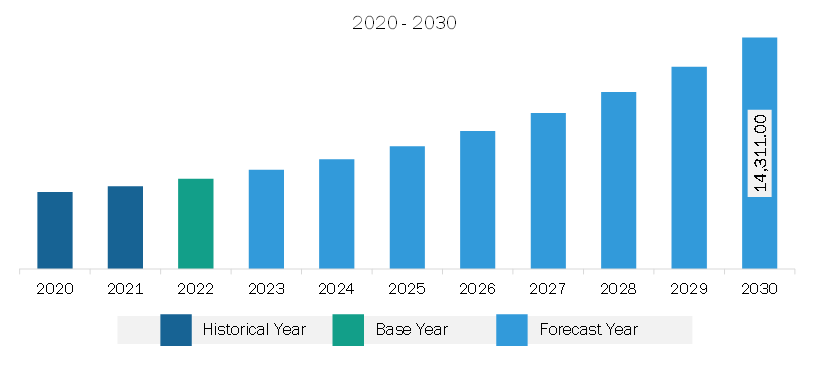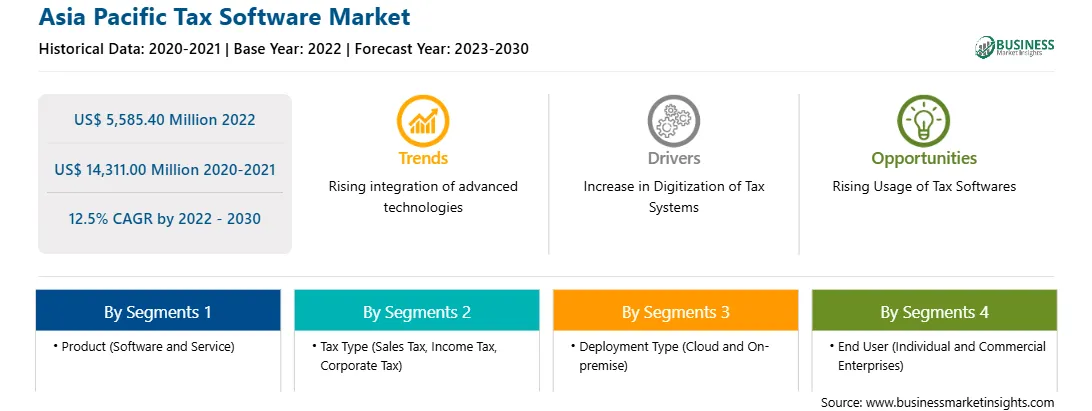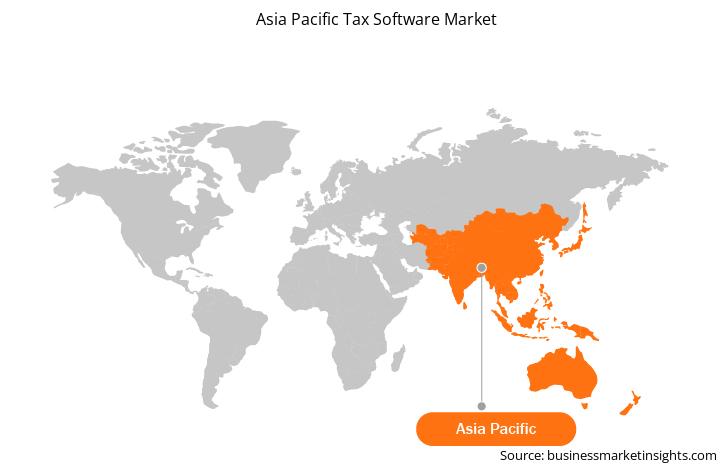The Asia Pacific tax software market is expected to grow from US$ 5,585.40 million in 2022 to US$ 14,311.00 million by 2030. It is estimated to grow at a CAGR of 12.5% from 2022 to 2030.
The retail sector has experienced a tremendous transformation with the growing trend of online shopping. According to the National Retail Federation (NRF), in 2023, retail sales are expected to increase by 4-6% compared to 2022. In 2021, the retail sales grew over 7% compared to 2020. Thus, the rise of online shoppers has led to the continuous introduction of various advanced technological solutions that help retailers increase their efficiency. Companies in the tax software market catering to retail sector maintain an enormous quantity of sensitive data that varies from financial statements, invoices, and legal contracts to e-mails and receipts. Retailers face vast pressures from stakeholders to gain higher returns. With advancements in solutions offering and pricing being no longer a barrier, they are increasingly adopting automated systems to enhance order accuracy, optimize business, and maximize throughput. Tax automation is a key part of operations in the retail sector; it helps retailers compile sales data from different systems and keep up with retail sales tax requirements. Automation helps them bring convenience to their operations and ensure compliance with minimal human efforts. Moreover, introducing digitalization in retail rules out the need for tax printouts and receipts, as governments have started to accept digital records instead of paper records for VAT submissions. Therefore, the growing scope of digitalization and tax automation in the retail sector is encouraging tax software providers to cater to more retail markets. The retail sector is among the rapidly evolving and essential sectors. Increasing penetration of supply chain technologies, changing competitive landscapes, rising sustainability concerns among customers, and growing regulatory pressure are facilitating transformation in the retail sector. With the help of tax automation, retailers can increase efficiency and lower the risk associated with manual tax management. It also assists them to enter new markets and establish sales channels that drive growth. Many retail companies are opting for cloud-based services. Cloud tax technology offers benefits such as business continuity management (BCM) and cost-reduction, which leads to a lower total ownership cost and disaster recovery benefits. In addition, retailers that have adopted cloud tax technology are benefitted from cross-channel support (point-of-sale, e-commerce, mobile, etc.), speedy implementation, and scalability as additional advantages. Therefore, the adoption of tax software, especially cloud-based solutions, in the retail sector drives market growth.
The Asia Pacific tax software market is segmented into Australia, China, India, Japan, South Korea, and the Rest of Asia Pacific. The region is focused on bringing digitalization to gain a competitive advantage in the global market. According to the United Nations Economic and Social Commission for Asia and Pacific (ESCAP), the COVID-19 pandemic is one of the major drivers for the rapid adoption of digital technologies in the region. The adoption of digital technologies increased the efficiency of the public and private sectors, financial inclusion, access to education, and opening new markets by letting companies serve distant customers. In the tax industry, digitalization helped boost the number of internet users and facilitate the e-commerce markets that require innovative payment systems. to support this, in March 2022, the Organization for Economic Co-operation and Development (OECD) released a new Value Added Tax (VAT) Digital toolkit for Asia Pacific to guide the implementation of VAT strategy in e-commerce. This toolkit's objective is to assist the region's tax authorities with the outline and execution of reform to guarantee the effective collection of VAT on e-commerce activities. Thus, such government initiatives to boost digitalization and launch tax software solutions are likely to foster the growth of the tax software market in Asia Pacific.
The global market players are expanding their businesses in the region. For instance, in May 2023, PwC launched the Asia Pacific Marketplace across Indonesia, Singapore, Malaysia, Thailand, and Vietnam, with other areas soon to follow to cater to growing digitalization in the region. Under this strategy, PwC aims to provide its clients with digital solutions such as cybersecurity, data and analytics, and tax solutions. With this, the company introduced over 160 solutions, which includes licensed Software as a service (SaaS) product. Thus, such expansion and proliferation of software solutions leads to the adoption of tax software solutions across various industry verticals, further driving the tax software market in Asia Pacific.

Strategic insights for the Asia Pacific Tax Software provides data-driven analysis of the industry landscape, including current trends, key players, and regional nuances. These insights offer actionable recommendations, enabling readers to differentiate themselves from competitors by identifying untapped segments or developing unique value propositions. Leveraging data analytics, these insights help industry players anticipate the market shifts, whether investors, manufacturers, or other stakeholders. A future-oriented perspective is essential, helping stakeholders anticipate market shifts and position themselves for long-term success in this dynamic region. Ultimately, effective strategic insights empower readers to make informed decisions that drive profitability and achieve their business objectives within the market.

| Report Attribute | Details |
|---|---|
| Market size in 2022 | US$ 5,585.40 Million |
| Market Size by 2030 | US$ 14,311.00 Million |
| Global CAGR (2022 - 2030) | 12.5% |
| Historical Data | 2020-2021 |
| Forecast period | 2023-2030 |
| Segments Covered |
By Product
|
| Regions and Countries Covered | Asia-Pacific
|
| Market leaders and key company profiles |
The geographic scope of the Asia Pacific Tax Software refers to the specific areas in which a business operates and competes. Understanding local distinctions, such as diverse consumer preferences (e.g., demand for specific plug types or battery backup durations), varying economic conditions, and regulatory environments, is crucial for tailoring strategies to specific markets. Businesses can expand their reach by identifying underserved areas or adapting their offerings to meet local demands. A clear market focus allows for more effective resource allocation, targeted marketing campaigns, and better positioning against local competitors, ultimately driving growth in those targeted areas.

The Asia Pacific tax software market is segmented into product, deployment type, tax type, end user, and country.
Based on product, the Asia Pacific tax software market is bifurcated into software and services. The software segment held a larger share of the Asia Pacific tax software market in 2022.
In terms of deployment type, the Asia Pacific tax software market is bifurcated into cloud and on-premise. The cloud segment held a larger share of the Asia Pacific tax software market in 2022.
Based on tax type, the Asia Pacific tax software market is segmented into sales tax, income tax, corporate tax, and others. The sales tax segment held the largest share of the Asia Pacific tax software market in 2022.
Based on end user, the Asia Pacific tax software market is bifurcated into commercial enterprises and individual. The commercial enterprises segment held a larger share of the Asia Pacific tax software market in 2022. Further, commercial enterprises segment is categorized into enterprise size (large enterprises, medium enterprises, and small enterprises) and vertical (IT & telecom, retail, BFSI, government, healthcare, and others).
Based on country, the Asia Pacific tax software market is segmented into China, Japan, India, South Korea, Australia, and the Rest of Asia Pacific. China dominated the Asia Pacific tax software market in 2022.
Sage Group Plc, Thomson Reuters Corp, Xero Ltd, IRIS Software Group Ltd, Wolters Kluwer NV, Intuit Inc, HRB Digital LLC, and SAP SE are some of the leading companies operating in the Asia Pacific tax software market.
1. Sage Group Plc
2. Thomson Reuters Corp
3. Xero Ltd
4. IRIS Software Group Ltd
5. Wolters Kluwer NV
6. Intuit Inc
7. HRB Digital LLC
8. SAP SE
The Asia Pacific Tax Software Market is valued at US$ 5,585.40 Million in 2022, it is projected to reach US$ 14,311.00 Million by 2030.
As per our report Asia Pacific Tax Software Market, the market size is valued at US$ 5,585.40 Million in 2022, projecting it to reach US$ 14,311.00 Million by 2030. This translates to a CAGR of approximately 12.5% during the forecast period.
The Asia Pacific Tax Software Market report typically cover these key segments-
The historic period, base year, and forecast period can vary slightly depending on the specific market research report. However, for the Asia Pacific Tax Software Market report:
The Asia Pacific Tax Software Market is populated by several key players, each contributing to its growth and innovation. Some of the major players include:
The Asia Pacific Tax Software Market report is valuable for diverse stakeholders, including:
Essentially, anyone involved in or considering involvement in the Asia Pacific Tax Software Market value chain can benefit from the information contained in a comprehensive market report.